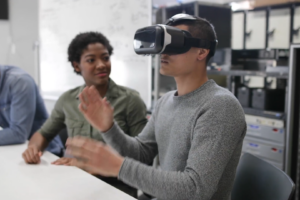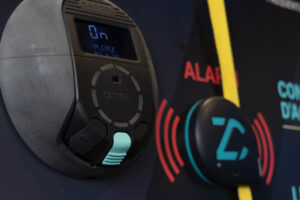
EpiGe-App: An algorithm that facilitates the diagnosis of medulloblastoma
September 30, 2024
MELOA: New low-cost, low-power drifters to improve sea observation and monitoring systems in coastal and oceanic areas
October 2, 202401/10/2024
A group of researchers from the Nautical Faculty of Barcelona (FNB) of the Universitat Politècnica de Catalunya – BarcelonaTech (UPC) is developing a system based on machine learning technologies to improve the energy efficiency and reduce the fuel consumption of ships from the NGO Open Arms. This project, called FNB-Open Arms, is the first case of technology transfer from the Fractus-UPC Deep Tech Hub, a collaboration initiative between the company Fractus and the UPC, that aims to promote innovation in deep technologies.
The project aims to optimize the fuel consumption of the Open Arms, an old 37 meter tug that can consume up to 3,000 litres of diesel per day. In a first phase, the system will monitor different parameters such as the speed, the state of the sea, and the trim of the boat (the adjustments that are made in various elements of the boat to gain propulsion and make the most of its power motor) to build a machine learning model. This model will learn to identify the navigation conditions that allow the longest distances to be covered with the least fuel consumption.
In later phases, other factors such as the state of the hull, electrical needs or weather conditions will be incorporated, with the aim of determining the most efficient propulsion conditions in real time. Thus, the environmental impact will be reduced and resources will be saved that Open Arms can allocate to its mission of rescuing people at sea.
The sensors that will capture the data are already present on the ship, such as the AIS, GPS or power plant systems, to which will be added flowmeters financed by Fractus, which will be installed shortly. The system, in addition to reducing fuel consumption, will contribute to the early identification of technical problems, which will extend the useful life of the ship's engine.
This technology not only reduces costs and pollutant emissions, but also allows Open Arms to devote more resources to its humanitarian work. Likewise, the technology will facilitate compliance with environmental regulations and improve the planning of maritime routes.
Currently, there is no similar system on the market that uses machine learning technologies to monitor in real time the factors that influence the optimal navigation of a boat.
The project began in January 2024 and it is planned that in the coming weeks the system will be deployed on the vessel to define the navigation options and proposals. In the successive phases it is planned to carry out the validation tests during some missions, make improvements and incorporate new parameters into the system (all those considered necessary), with the hope of replicating the model on other vessels of the NGO Open Arms in the future.
The FNB researchers participating in the project belong to the Mechanics of Continuous and Computational Media research group - (MC)2 and to the Maritime Transport and Port Logistics Research Group (TRANSMAR), to the Analysis and Technology of Structures and Materials (ATEM) and from the group of Intelligent Control Systems (SIC).
The project has been awarded the UPC Award for Social Commitment 2023 for its impact on society. Likewise, Fractus has financed the acquisition of the flow meters, necessary for the completion of the project.



Related Projects
- The Image and Video Processing Group (GPI), part of the IDEAI-UPC research group, and the Digital Culture and Creative Technologies Research Group (DiCode) from the Image Processing and Multimedia Technology Center (CITM) at the Universitat Politècnica de Catalunya – BarcelonaTech (UPC), have co-organised the AI and Music Festival (S+T+ARTS) together with Sónar+D and Betevé, to explore the creative use of artificial intelligence in music.
- The Visualisation, Virtual Reality and Graphic Interaction Research Group (ViRVIG) at the Universitat Politècnica de Catalunya - BarcelonaTech (UPC) has participated in the XR4ED project, an initiative that connects the educational technology (EdTech) and Extended Reality (XR) sectors, with the aim of transforming learning and training across Europe.
- The inLab FIB at the UPC has collaborated with Lizcore® for the development of a proof of concept based on artificial intelligence to improve safety in climbing with autobelay devices. The system allows the automatic and accurate detection of risk situations before starting a route.
- Researchers from the Centre for Image and Multimedia Technology of the UPC (CITM) and from the DiCode research group (Digital Culture and Creative Technologies Research Group) of the Universitat Politècnica de Catalunya – BarcelonaTech (UPC) have worked on the project The Eyes of History, an initiative of the Catalan Agency for Cultural Heritage that offers an immersive view of Catalan cultural heritage. It is especially aimed at the first and second cycles of secondary education and was created to bring heritage into the classroom. Its goal is to bring the history and monuments of Catalonia closer in a vivid and innovative way, using tools such as virtual reality and new museographic narratives.




